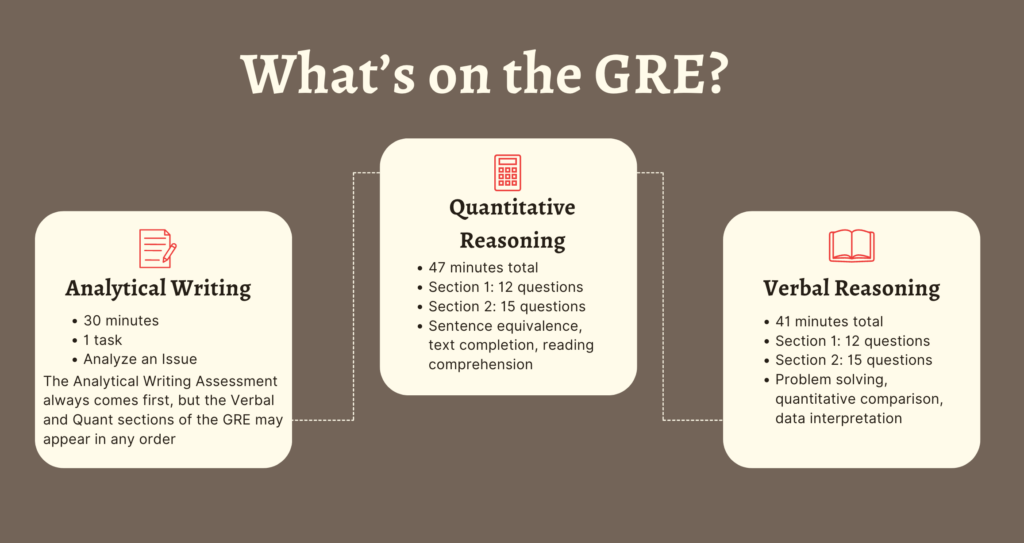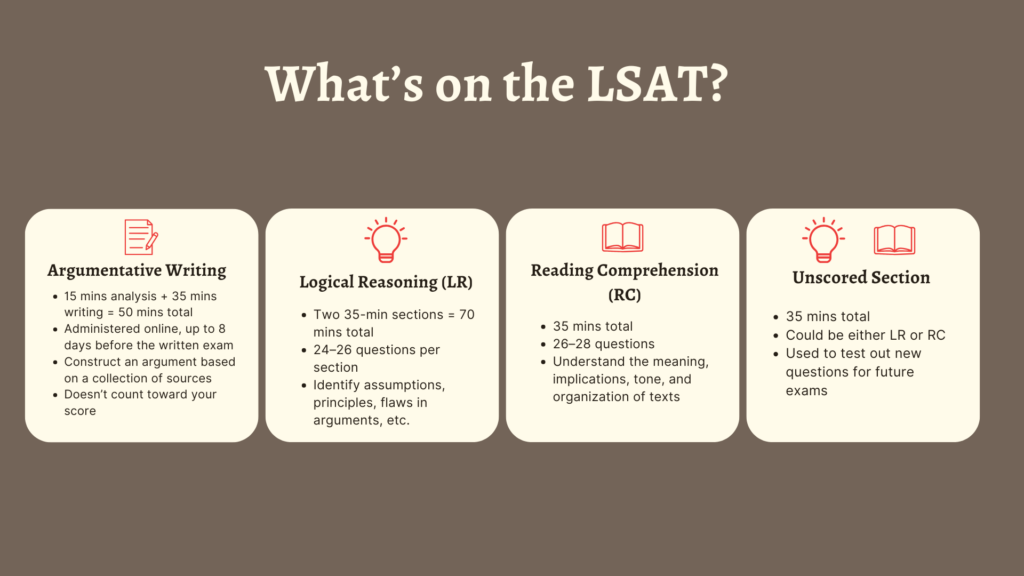If you’re in the beginning stages of applying to law school, figuring out how you’ll meet the standardized testing requirements of your target schools should be at the top of your to-do list as one of the first steps in the law school application timeline. This used to mean only one thing: prepping to take the Law School Admission Test—more commonly known as the LSAT.
However, in the past few years, many law schools have changed their testing requirements, now accepting the GRE (Graduate Record Examinations) in place of the LSAT as part of the admissions process.
So is the field now split pretty evenly between the LSAT and the GRE? Not at all:
But what does that mean for your choice of exam? Read on to learn the details.

The LSAT was introduced in 1948 after collaboration among representatives from Columbia, Harvard, and Yale law schools. The test was created to standardize admissions, predict academic success in law school, and measure skills relevant to legal studies rather than prior knowledge. Since then, the LSAT has been ubiquitous; it’s required by over 200 law schools in the US, Canada, and Australia and often serves as a primary filter for applicants to top law schools.
The first law school to allow applicants to submit GRE scores instead was the University of Arizona Law School in 2016. Harvard followed suit in 2018, and, after the ABA (American Bar Association) Section of Legal Education and Admissions to the Bar voted to accept the GRE as well as the LSAT in 2021, many additional law schools did the same.
Now, all T20 law schools (and many others) accept both the LSAT and the GRE in their application process.
So is it just an arbitrary choice between the two exams? Not exactly.
The GRE and LSAT have a couple of core similarities: they are both highly advanced exams used in the admissions processes of graduate programs. But the two tests differ widely in terms of purpose, target audience, content, and method of delivery, among other factors.
Let’s go into how the LSAT and GRE compare structurally.
In terms of test format, the GRE has three sections, shown in the image below:

In contrast, the LSAT includes

Additionally, the GRE is a section-level adaptive online exam, while the LSAT is a paper-delivered test. That means that on the GRE, you’re served more difficult questions as the test goes on if you performed well on the earlier sections—whereas the difficulty level of all sections on the LSAT is the same for everyone.
For the GRE, you receive three separate scores, one for each section. The Verbal and Quantitative sections are each scored on a scale of 130–170, and the Analytical Writing section is scored in half-point increments from 0 to 6. The first two scores are added up for a total out of 340; the Analytical Writing score isn’t part of this total, but it’s still a part of your GRE results that schools will look at.
The LSAT is scored on a scale of 120–180, not including the unscored RC or LR section or the writing sample, which must be completed but don’t affect your score.
You can roughly compare GRE scores to LSAT scores based on percentiles, meaning a GRE score in the 90th percentile would be comparable to an LSAT score in the 90th percentile, and so on.
However, it’s important to keep in mind that 90th-percentile GRE scores will not mean the same thing to law schools as 90th-percentile LSAT scores.
Historically, a good LSAT score is a reliable predictor for success at top law schools. The same cannot be said about a good GRE score. Since the decision to accept the GRE at certain law schools is so recent, there is little data linking GRE scores to law school preparedness and overall success.
The GRE and LSAT were designed with different purposes in mind.
The LSAT aims to test skills that are seen as highly relevant to the study and practice of law: logical reasoning, reading comprehension, and argumentative writing. While the exam no longer includes the Analytical Reasoning (Logic Games) section, replacing it with a second Logical Reasoning section, it still aims to test your deductive reasoning skills as well.
In contrast, the GRE was designed to assess the intellectual skills of students applying for many different graduate programs, measuring verbal reasoning, quantitative reasoning, and analytical writing skills.
To accept the GRE general test, universities must believe it can fairly evaluate applicants on a common scale, potentially reducing bias and promoting a more diverse applicant pool.
But it can be argued that the quantitative section has little relevance for law school and that the materials on the other sections, unlike those on the LSAT, are not weighted toward materials likely to be encountered in a legal context.
Even though people often claim the LSAT is harder than the GRE, the question of which test is easier really depends on individual strengths and weaknesses.
For most test takers, the GRE is considered easier because it covers broader skills applicable across disciplines and allows more flexibility in answering questions. However, unlike the LSAT, it includes a math (“quant”) section, which may be more challenging for individuals with more of a humanities background—which describes most law school applicants.
Individuals with strong verbal and analytical reasoning skills may find the LSAT easier if they excel at tasks like dissecting arguments or analyzing complex tasks. The verbal reasoning sections of the LSAT are generally considered harder than those seen on the GRE due to their complexity and time pressure. The LSAT also emphasizes logic skills unique to legal studies, which may be unfamiliar to test takers.
Psychology also plays a role in the perceived difficulty levels of the exams. The LSAT is often perceived as more intimidating due to its unique structure, high stakes in law school admissions, and strict score reporting policies (all scores from the past five years are visible unless canceled). The GRE can be less intimidating, as test takers can choose which scores to send to schools and can attempt the test more frequently.
Ultimately, your choice between the two tests should be informed by an assessment of your own abilities and academic priorities.

When deciding whether to take the GRE or LSAT, you should start by checking which of your target law schools accept the GRE in place of the LSAT. If any of the specific law schools you’re applying to don’t accept the GRE and require you to submit an LSAT score, you will obviously need to choose the LSAT.
In most cases, when you’re applying to law school, the LSAT should be your first choice.
As the leading assessment of critical thinking, the LSAT tests a prospective law student’s ability to solve problems in a legal context. According to the Law School Admissions Council (LSAC), the LSAT is the only test that’s accepted by all ABA-accredited law schools and the only test designed specifically as a predictive measure for success in law school.
In other words, the LSAT was specifically designed to predict student outcomes in law school and assess whether the test taker will succeed in a future legal career. It’s likely to hold more weight with admissions officers for this reason alone.
You should never have to take both the GRE and the LSAT, so if you’ve already taken the GRE and are happy with your score (and all your target schools accept GRE scores), there’s no good reason to take the LSAT as well. Many schools will only allow you to submit scores from one standardized test anyway.
Another factor to consider is whether or not you are only applying to law schools. If you plan to apply to other graduate schools or dual-degree programs, the GRE might be a better fit due to its applicability to a wide range of programs.
Can’t I maximize my odds by taking both exams and submitting the more impressive score, or submitting both scores? Short answer: bad idea.
In many cases, law schools do not permit applicants to submit scores from multiple tests. And if they do, the LSAT is likely to be given precedence in their consideration, as LSAT scores are more directly tied to school rankings.
Some schools even have a policy stating that candidates who have taken both exams may only submit their LSAT score—it takes precedence over the GRE. For instance, Yale’s guidelines state that “if you have a reportable LSAT score, you may not submit a GRE score for consideration.”
Additionally, preparing for two separate exams would require significant time and financial investment. You’ll see better results if you focus all your attention on acing one exam, and this is what we strongly recommend.
Most law school admissions officers claim to have no preference for one test over the other; however, most admitted law school applicants still take the LSAT rather than the GRE. Remember the statistic we cited above—only 700 out of 38,500 enrollees in 2024 took the GRE.
In short, if you haven’t taken either test and know you’ll be applying only to law schools, you should take the LSAT.
Even if it has a reputation for being the “more challenging” exam and might require more preparation, a strong LSAT score translates into a strong law school application, ultimately raising your chances of being accepted at top law schools.
Your background and goals matter when choosing between the LSAT and GRE, so before taking either exam, it’s important to know where you want to go next. Consider reaching out to a Menlo Coaching consultant to discuss your law school goals and how to achieve them.